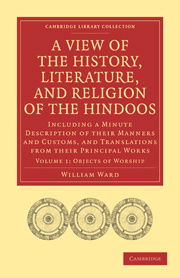 A View of the History, Literature, and Religion of the Hindoos
A View of the History, Literature, and Religion of the Hindoos Book contents
- Frontmatter
- Contents
- INTRODUCTORY REMARKS
- CHAP. I OF GOD
- CHAP. II OF THE GODS
- CHAP. III OF THE GODDESSES
- CHAP. IV INFERIOR CELESTIAL BEINGS OBJECTS OF WORSHIP
- CHAP. V OF THE TERRESTRIAL GODS
- CHAP. VI TERRESTRIAL GODDESSES
- CHAP. VII DEITIES WORSHIPPED BY THE LOWER ORDERS ONLY
- CHAP. VIII WORSHIP OF BEINGS IN STRANGE SHAPES
- CHAP. IX WORSHIP OF HUMAN BEINGS
- CHAP. X WORSHIP OF BEASTS
- CHAP. XI THE WORSHIP OF BIRDS
- CHAP. XII THE WORSHIP OF TREES
- CHAP. XIII THE WORSHIP OF RIVERS
- CHAP. XIV THE WORSHIP OF FISH
- CHAP. XV THE WORSHIP OF BOOKS
- CHAP. XVI THE WORSHIP OF STONES
- CHAP. XVII A LOG OF WOOD WORSHIPPED
CHAP. IX - WORSHIP OF HUMAN BEINGS
Published online by Cambridge University Press: 05 October 2010
- Frontmatter
- Contents
- INTRODUCTORY REMARKS
- CHAP. I OF GOD
- CHAP. II OF THE GODS
- CHAP. III OF THE GODDESSES
- CHAP. IV INFERIOR CELESTIAL BEINGS OBJECTS OF WORSHIP
- CHAP. V OF THE TERRESTRIAL GODS
- CHAP. VI TERRESTRIAL GODDESSES
- CHAP. VII DEITIES WORSHIPPED BY THE LOWER ORDERS ONLY
- CHAP. VIII WORSHIP OF BEINGS IN STRANGE SHAPES
- CHAP. IX WORSHIP OF HUMAN BEINGS
- CHAP. X WORSHIP OF BEASTS
- CHAP. XI THE WORSHIP OF BIRDS
- CHAP. XII THE WORSHIP OF TREES
- CHAP. XIII THE WORSHIP OF RIVERS
- CHAP. XIV THE WORSHIP OF FISH
- CHAP. XV THE WORSHIP OF BOOKS
- CHAP. XVI THE WORSHIP OF STONES
- CHAP. XVII A LOG OF WOOD WORSHIPPED
Summary
Deified Men and Women
All the bramhuns, but especially the religious guides, (gooroo,) are objects of worship among the Hindoos, and have divine honours paid to them. The spiritual guide, in the estimation of the disciple, is literally a god. When-ever he approaches, the disciple prostrates himself in the dust before him, and never sits in his presence without leave. He drinks the water with which he has washed the feet of his gooroo, and relies entirely upon his blessing for final happiness. I have heard some Hindoos speak with comparative contempt of all other ways of salvation. When the claims of the bramhŭns to deity have been disputed by any one, I have seen the poor besotted shōōdrŭ prostrate himself at the feet of the nearest bramhŭn, and, raising his head, and closing his hands, say, ‘You are my god.’ At the same time the character of the bramhŭn has perhaps been notorious for every vice.
The shastrŭs declare that the daughters of bramhŭns, till they are eight years old, are objects of worship, as forms of the goddess Bhŭgŭvŭtēē; and some persons worship these girls daily. The worshipper, taking the daughter of some neighbouring bramhŭn, and placing her on a seat, performs the ceremonies of worship; in which he presents to her flowers, paint, water, garlands, incense, and, if a rich man, offerings of cloth and ornaments.
- Type
- Chapter
- Information
- A View of the History, Literature, and Religion of the HindoosIncluding a Minute Description of their Manners and Customs, and Translations from their Principal Works, pp. 245 - 248Publisher: Cambridge University PressPrint publication year: 2010First published in: 1817


